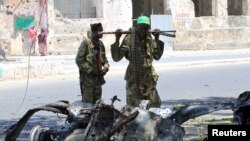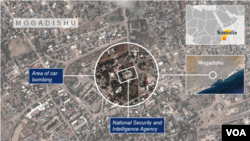NAIROBI, KENYA —
Somali officials say at least 12 people died and a dozen others were wounded when a car bomb exploded at a restaurant near the headquarters of Somalia's National Intelligence and Security Agency in Mogadishu.
The attack Thursday near the intelligence headquarters is one in a series of terror attacks targeting areas frequented by Somali government officials and forces.
Local commissioner Abdullahi Hussein Hassan, speaking to reporters on the scene, told reporters the attacker targeted diners in a restaurant.
"They have attacked a restaurant full of people," he said. "The attacker exploded the car in front of the restaurant and killed innocent people."
Another local commissioner, Ali Hamari, described the carnage at the scene. "We rushed to the scene of the explosion," he said. "We have carried some dead bodies and [people with] injuries, but when we went inside the restaurant, there were so many bodies it's hard for me to say who is a soldier or a civilian at the moment, since we kept taking bodies away.
Responsibility
The militant group al-Shabab claimed responsibility for the attack, saying it was targeting security forces.
The group has previously warned civilians to avoid areas where Somali government forces and officials operate.
2006 - Launches insurgency to take control of Somalia and impose strict Islamic law
2008 - U.S. declares al-Shabab a foreign terrorist organization
2009 - Seizes control of parts of Mogadishu and the port city Kismayo
2010 - Expands control across central and southern Somalia, carries out deadly bombing in Kampala, Uganda
2011 - Blocks drought/famine aid from areas under its control
2011 - East African leaders declare al-Shabab a regional threat; Ethiopian, Kenyan troops enter Somalia to pursue the group, which is driven out of Mogadishu
2012 - Declares itself an al-Qaida ally, loses ground in Somalia, abandons strategic coastal stronghold Kismayo
2013 - Attacks Mogadishu court complex, killing more than 30 and attacks mall in Nairobi, Kenya, killing at least 69 people
2014 - Attack in Mogadishu kills more than 10 on New Year's Day
In a statement to the media, Somalia’s Prime Minister Abdiweli Sheikh Ahmed condemned Thursday’s attack, describing it as a betrayal of Islam and of peaceful Somali people.
Al-Shabab once controlled most of Mogadishu, but was pushed out of the city by African Union and Somali government forces in 2011.
The group still carries out periodic attacks in the city, including one last week when militants set off a car bomb at the presidential palace and stormed the compound with guns. At least 17 people were killed in the attack, although the president was not harmed.
The recent attacks have brought renewed insecurity and concerns to residents in Mogadishu, which has enjoyed a relative peace during the past two years.
The Somali government has vowed to stand strong against the militant group, with the goal of making streets in the capital safe and secure.
The attack Thursday near the intelligence headquarters is one in a series of terror attacks targeting areas frequented by Somali government officials and forces.
Local commissioner Abdullahi Hussein Hassan, speaking to reporters on the scene, told reporters the attacker targeted diners in a restaurant.
"They have attacked a restaurant full of people," he said. "The attacker exploded the car in front of the restaurant and killed innocent people."
Another local commissioner, Ali Hamari, described the carnage at the scene. "We rushed to the scene of the explosion," he said. "We have carried some dead bodies and [people with] injuries, but when we went inside the restaurant, there were so many bodies it's hard for me to say who is a soldier or a civilian at the moment, since we kept taking bodies away.
Responsibility
The militant group al-Shabab claimed responsibility for the attack, saying it was targeting security forces.
The group has previously warned civilians to avoid areas where Somali government forces and officials operate.
Al-Shabab Timeline
Al-Shabab Timeline2006 - Launches insurgency to take control of Somalia and impose strict Islamic law
2008 - U.S. declares al-Shabab a foreign terrorist organization
2009 - Seizes control of parts of Mogadishu and the port city Kismayo
2010 - Expands control across central and southern Somalia, carries out deadly bombing in Kampala, Uganda
2011 - Blocks drought/famine aid from areas under its control
2011 - East African leaders declare al-Shabab a regional threat; Ethiopian, Kenyan troops enter Somalia to pursue the group, which is driven out of Mogadishu
2012 - Declares itself an al-Qaida ally, loses ground in Somalia, abandons strategic coastal stronghold Kismayo
2013 - Attacks Mogadishu court complex, killing more than 30 and attacks mall in Nairobi, Kenya, killing at least 69 people
2014 - Attack in Mogadishu kills more than 10 on New Year's Day
Al-Shabab once controlled most of Mogadishu, but was pushed out of the city by African Union and Somali government forces in 2011.
The group still carries out periodic attacks in the city, including one last week when militants set off a car bomb at the presidential palace and stormed the compound with guns. At least 17 people were killed in the attack, although the president was not harmed.
The recent attacks have brought renewed insecurity and concerns to residents in Mogadishu, which has enjoyed a relative peace during the past two years.
The Somali government has vowed to stand strong against the militant group, with the goal of making streets in the capital safe and secure.






